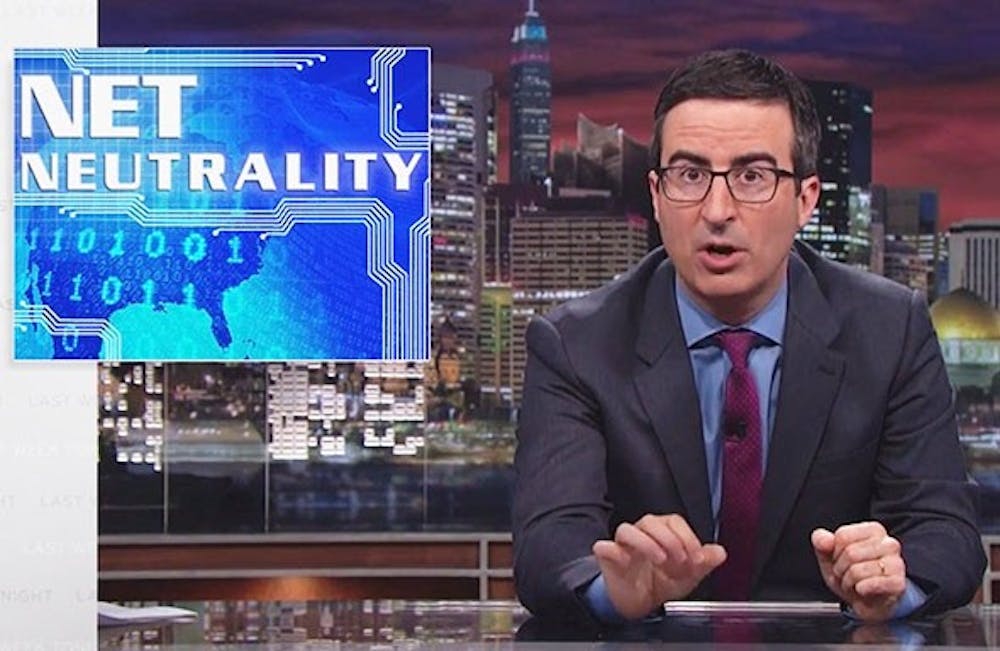Net Neutrality: a definition
Net Neutrality is the concept that all internet data has to be treated equally by service providers no matter who created it or what it is. This principle is one of the key reasons that internet startups can seriously compete—and be so successful (think Facebook back in the Myspace days).
Have I heard about this before?

Well, if you’re really into telecommunications law, then you’ve definitely read about this one in section 706 of the Telecommunications Act of 1996. If your nerdiness takes its form elsewhere then you might’ve heard about net neutrality over the past few months, since there’s been a huge debate about it going on since April. Most likely, you saw John Oliver’s hilarious and impressively fact–checked clip explaining net neutrality from his HBO show “Last Week Tonight.”
So, why is this controversial?
Over the last year, the Federal Communications Commission (FCC) was faced with a proposal that essentially ends net neutrality. It suggests a multi–tiered system, in which certain sites and companies can pay internet providers for priority treatment and entrance into the new "fast lane." If you're wondering why the FCC is bothering to consider the change in the first place, you should know it is legally obligated to. Verizon sued the government, and then the court basically told the FCC that it has to figure this shit out.
Team Net Neutrality

A diverse cast of characters has rallied together in support of net neutrality. Most internet giants (Netflix, Facebook, Amazon, Google, etc.) have joined the usual freedom hippie activists, throwing up their support for the rule that essentially birthed them. Basically this team is like, why can’t everyone just metaphorically drive together? Why fix what isn’t broken? Why is the internet always compared to a highway?
Team Two–Speed Highway
Not surprisingly, the people who think the two–speed highway system is super great (okay, they don’t call it the two–speed highway for real) provide your Internet: the cable companies. So basically, just Time Warner Cable, Comcast, Cox, Verizon, and AT&T. Net neutrality is the only thing holding them back from charging websites massive fees for premium speeds or really any service at all. Get rid of net neutrality, and why wouldn’t the cable guys charge for the high–speed service? What about those people who can’t pay? Why not slow down their speeds just enough to convince them to pay up?
Is this political?

Isn’t everything political? According to the Center for Responsible Politics, Comcast has spent almost 19 million dollars in lobbying for their cause in the last year. So, cable companies use money to lobby, and they employ people as professional lobbyists. One of those people is Tom Wheeler—well, one of those people was Tom Wheeler. That was before Obama picked him to be the chair of the FCC last May. If you’re in the mood to get angry about this, you should know that 30 other countries pay less for internet than us. Estonia is one of those countries.
And, yes, people are actually protesting...

Two Wednesdays ago (9/10) was a big day for Internet activism and not just online. This is yet another example that people fucking love combining their rights of freedom of assembly and freedom of speech (or maybe its just a sign that people have way too much time on their hands). About 50 activists gathered outside the Comcast headquarters in Center City in support of net neutrality and in opposition of Comcast’s potential merger with Time Warner Cable (talk about putting hotels on the blue spaces). Rallies also went down in NYC and Chicago. Online, Wednesday was dubbed “Internet Slowdown Day,” during which tons of websites, including big names like Kickstarter, Reddit, WordPress and our personal favorite Netflix, put animated loading signs all over their site with information about the current threat to net neutrality.
What does this have to do with Film and TV?

Well, first of all, the lovely companies that control your internet also control your TV, if you have one. And for those of you who haven’t seen a TV since you lived at home this summer, net neutrality affects your TV consumption even more. Maybe you saw the fake loading wheels that Netflix put up in protest. Yeah, they’re pissed and not alone. Netflix, Amazon Prime, Hulu, and especially your favorite illegal sites are all going to suffer if net neutrality isn’t protected. If you think Hulu’s current partnerships with cable companies are annoying, things are about to get a whole lot worse. And one of four things will happen if this anti–net neutrality proposal goes through:
1) You will spend many an hour looking at the rainbow spinning wheel of death (ain’t nobody got time for that).
2) You'll have to pay or pay more for the streaming services you already use ($8.99 per month never sounded so cheap).
3) You'll give up and buy a TV and cable like people in the Middle Ages (and support the companies that put you in this situation to begin with).
4) Stop watching all your favorite TV shows and just read the online recaps at 34st.com (just kidding, we can't afford cable either.)
And more importantly, what does this have to do with me ?

Net neutrality affects everything you do online. Yes, even your porn–watching. So unless loading wheels and slow downloading speeds really turn you on, getting rid of net neutrality will somehow negatively impact your time online. If you happen to have dreams of your own internet startup, maybe it’s time to sell your soul and do some OCR instead. If you have dreams of inheriting daddy’s cable company fortune or becoming the next Tom Wheeler, then maybe getting rid of net neutrality would actually help you in the future. And if you fit into neither of those categories, you’re a normal person who might have to waste a little more time or money to surf the interweb.
Now what?
Well the FCC was taking comments from the peanut gallery until last Monday (9/15). Three million people wrote or called in. It’s hard to guess what will happen, but the commission needs to decide by the end of 2014. For now, we recommend cherishing how quickly you can hit that “next episode play” button and have your wish granted—the fairy godmother of the internet might be dead pretty soon.







